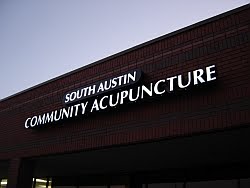This all started with my trip to MD Anderson's Integrative Oncology Conference for acupuncturists. What I experienced there was the unrelenting yet thoughtful questioning of
everything. I found this to be incredibly refreshing. This is very different from how acupuncture is traditionally and commonly taught.
I was actually attempting to take on the subject of patient communication last time I wrote (after a patient asked me if I had studied acupuncture!?), but the juxtaposition of what I was presented with at a science based conference on acupuncture, and a perusal of some rather ordinary acupuncture reading materials led to something bigger. This is difficult stuff to write about and I have struggled to tie it all together. It makes people uncomfortable.
This discomfort lies in the fact that I am touching on acupuncture's sacred cows - a 'sacred cow' being something considered (perhaps unreasonably) immune from question or criticism (for those not up on your bovine idioms).
If you look back at the articles I referenced
last time, despite their entirely different perspectives, I think they both speak to
a wont of some special knowledge or ability. In the piece on research standards, the question is posed whether the usual scientific methods can even capture this knowledge, and the Master Tung piece is presented as simply knowledge beyond question.
Obviously, when you seek out a licensed professional of any kind, you do so because you seek their expertise. But what I'm talking about here is not just the knowledge of a trained professional. I'm talking about the
exaltation of a body of knowledge.
At
SACA we actually work hard to keep things down to earth, and to make acupuncture something more ordinary, and more accessible. As such we sometimes have to negotiate patients' preconceptions about what we do. The people I work with think I'm about half nuts as I try to articulate these concepts, as apparently do some of my patients as well, but I think what I'm writing about here is central to operating a community acupuncture clinic.
Why?
Because I think it is important to put acupuncture in some kind of perspective, and I think community acupuncture sort of builds this perspective into the model. Acupuncture doesn't have to be complicated to be effective. Community acupuncture very simply places emphasis on access to treatment and frequency of treatment over practitioner mystique. No sacred cows here. Frequency trumps cleverness. I came to practice this way because I felt that the community acupuncture model was free of the trappings that have kept acupuncture obscure and inaccessible - to both practitioners and patients. I still feel this way.
So again, the ultimate motivation for my getting into all this was patient perception and expectation - which is pretty fascinating, and only occasionally concerning. What I'm learning is that the occasional interactions of concern all seem to arise out of patients coming in with some kind of preconceived notions about what acupuncture is about. Interestingly, these are typically people who have never had acupuncture yet strangely want to hold us to our sacred cows. Sorry if I've burst any bubbles.
I'm a pretty straight forward and not particularly mystically inclined person. I practice a form of medicine that is largely historically based rather than evidence based, and I am intrigued by the intersection of these two worlds. If my training and experience tells me acupuncture will not solve a problem this doesn't mean I don't "believe" in acupuncture. I strive to discern reality clearly, not merely impose my beliefs on it. It's OK for acupuncture to not be everything.
Ultimately any authority I possess is born of direct experience. And my direct experience of acupuncture is that I've been told a lot about acupuncture, but in fact very little of what I have been told do I
actually know to be true by my direct experience. I'm not doubting acupuncture or my own abilities when I say this. I am questioning if it works in quite the way we are taught. I have always questioned this.
Nick Kurtz, a community acupuncturist from Kansas recently gave a report on the
CAN website about the 2011
NADA conference. 'Dr. Michael Smith had some choice words for acupuncturists: He talked about how the acupuncture books ignore current research in favor of thousand year old texts and that that is completely unacceptable for health care providers. If we accepted the research then the books would get real thin real fast, and training would be simpler and cheaper, and more people would be helped. He talked about how the research shows that point location does not matter and that different styles of acupuncture and sham acupuncture are all effective - and if all that is true then most acupuncturists don't understand how acupuncture works. He said acupuncture right now is more like a religion then medicine, and acupuncture books are more like the bible than a medical textbook'
Those sacred cows again.
Now I gotta tell you, writing stuff like I'm writing has been cause for great debate around here. Concern has been expressed that what I'm saying will be construed as an acupuncturist expressing skepticism about acupuncture. That's not the case at all. I have no doubt as to the profundity of this medicine. And my intention in no way is to disparage the rich historical body of knowledge on which it is based. I'm friends with Will Morris, and I use some Master Tung stuff in my practice. However, that what I'm saying is so challenging is to me indicative of how hard it is for the acupuncture profession to question itself - and that needs to change.
More on the wacky world of science later....








